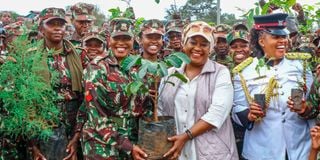African women not mere climate victims but solution providers

Tessie Musalia, patron of the Ushirika Wema Initiative (second right) with women in uniform poses with tree seedlings during the initiative's tree restoration programme at the National Police College, Embakasi 'A' Campus, Nairobi on July 23, 2023.
Thomas Edison said, “A good intention with a bad approach often leads to a poor result.” That could not be truer about today’s climate conversation, especially in the context of African women.
For decades, the discourse has painted a dangerously oversimplified picture of vulnerability in the Global South with women commonly depicted as the primary victims. But while the representation highlights an undeniable truth about their susceptibility, it also eclipses their resilience, strength and potential as change agents in Africa’s just transition.
But women seek and provide alternative foods for their families in times of acute shortage. They devise water storage methods to cushion their households against drought. It is also women who are the primary custodians of indigenous knowledge systems applied successfully across generations to make their communities more resilient to extreme weather changes. Their role in shaping Africa’s climate-resilient future cannot, therefore, be overstated.
And, for many women in Africa, vulnerability is not solely a product of gender. It is an intricate fabric of socioeconomic conditions, cultural norms and political representation challenges, among other factors. These multi-faceted vulnerabilities often place women at a precarious position, where systemic socioeconomic challenges such as poverty intersect with inadequate political representation and decision-making power to expose them to the effects of climate change.
It is, therefore, crucial to explore the place of women in the climate discourse beyond the conventional narratives and tunnel-vision approaches. Africa experiences climatic extremities due to its geographical and environmental circumstances. Moreover, the deeply entrenched socio-cultural dimensions such as gender, class, patriarchy and ethnicity in the continent significantly determine an individual or community’s level of risk.
But African women are rising. They are resisting this historical representation as mere victims. Thus, hundreds of them converged on Ghana in October for the Feminist COP28, a “bold and safe space” bringing together feminists, climate activists, indigenous peoples’ leaders and young women advocates to connect and design ways to “engage, disrupt and show up” at COP28. Such forums are critical as they expand the space for women and other vulnerable groups to engage. Climate change interventions must yield a sustainable future by carrying everyone along.
Adaptation
As the climate crisis intensifies, the need for adaptation becomes ever more pressing. Adaptation, in this context, is not merely about building higher seawalls or adopting drought-resistant crops. These, though, are essential. Rather, it is about holistic strategies that consider the unique needs and knowledge of communities. Embracing a feminist approach to climate action acknowledges the interconnectedness of environmental and social equity and emphasises that gender justice and climate justice are fundamental to the transition to a better future.
African women predominantly manage farming and household water resources. Their intimate knowledge of land, seasons and local ecosystems positions them uniquely in the fight against climate change. For women’s insights to truly shape adaptive strategies, however, systemic challenges that consign them to the back burner of solutions must be addressed. This includes ensuring their access to education, infrastructure and vital resources such as finance.
Equally important is challenging and reshaping the power dynamics and societal structures that limit their active participation in community decisions. The journey towards a resilient and sustainable future demands not just technical solutions but also inclusivity.
Gender justice
By incorporating their perspectives, not only do we champion gender justice but also make strides toward effective, lasting solutions to the monumental challenges posed by climate change. There is no adaptation to climate change without the central plank that is women. Sadly, we have not seen enough interventions to support them to continue playing these roles that allow our communities to stand in the face of disaster.
The COP28, in Dubai, should reorient climate action by decisively elevating the place of gender by highlighting the unique needs and contributions of women in the global climate discourse. But we must also go beyond merely highlighting women’s needs. This is “a good intention with the wrong approach”. After all, talking about vulnerability for years has benefitted neither the women nor the world.
Recognising the complexities faced by women in regions like Africa is a critical step. It also means empowering them, harnessing their knowledge and putting them at the forefront of adaptation strategies. These constitute a recipe for a resilient, just and equitable future. Leaving African women out of the fight against the climate crisis is not a choice. They are Africa’s fiercest warriors. The frontline in this battle for our lives and the planet is their place. They must take their position. Now.
Ms Ally is an adviser on energy at Power Shift Africa. [email protected].





